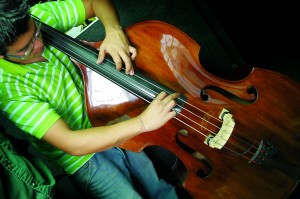 by Katherine Pukinskis –
by Katherine Pukinskis –
Surviving music school auditions is like a day-long performance. It’s hard to be at your best (as a human and a musician) when you’re tired, and there’s no way around it: this is going to be a tired time for you. Here are some hints for making it through:
1. Get Sleep. Really. As much as you can. Sacrificing sleep in order to do any kind of work will sacrifice the quality of work that you are able to do. Don’t rely on energy drinks or caffeine to get you through. (Plus, those can really mess with your fine motor control, one of the big skills required for playing an instrument.)
2. Keep to your rituals or create new ones. There are all sorts of variables (eg., travel, time zones, weather) that throw a wrench in your system, and it’s important to have an established routine or set of activities that you can rely on. It can be a daily ritual like stretching before you go to bed, or a pre-audition ritual like always eating eggs for breakfast on audition day.
3. Thank your parents for dealing with you during your crazy stress-monster auditions. When I was auditioning for schools, my parents got used to my routine of not eating or speaking for up to 24 hours before an audition, and then being famished and extremely talkative immediately afterwards. They quietly accepted my peculiarities and chalked them up to the “audition crazies.” If you are lucky enough to have parents who can deal with your crazies, remember to thank them.
4. Keep up with your homework. Teachers are usually pretty great about extensions for projects during this stressful time, but don’t use that as an excuse for not doing any work at all. Use car and plane rides to stay on top of your homework.
5. Have an outlet to get away from music for a while. Sometimes, with all of the practicing and rehearsing and auditioning, it’s just too much music. It’s important to have something that “resets” or “recharges” your work.
And remember, everyone is different. What worked for me may not work for you. The best thing to do is to listen to yourself and take care of the bigger instrument –– you.
 Katherine Pukinskis is a renown composer as well as assistant professor of music and chair of the Contemporary Creative Practice Division at Carnegie Mellon University School of Music. She holds a PhD in Composition from University of Chicago and bachelor and master’s degrees in Composition from Carnegie Mellon University.
Katherine Pukinskis is a renown composer as well as assistant professor of music and chair of the Contemporary Creative Practice Division at Carnegie Mellon University School of Music. She holds a PhD in Composition from University of Chicago and bachelor and master’s degrees in Composition from Carnegie Mellon University.


Janay
Hi I just have a quick question… I just started getting serious about my music and playing the piano as well as singing and I’ve decided that I wanted to major in music. I’m a senior now and started about in August before starting the school year. I’m a decent player as well as singer but is it still possible to get into a music program for college? I don’t want to go to a big-named one like Berklee or anything. Thanks!
MajoringInMusic
Unless you’ve applied to liberal arts colleges where you’re given at least a year before having to decide on a major, you have to apply and audition before being admitted as a music major. And yes, it would be too late for the upcoming Fall semester. Also, your audition needs to be strong enough to gain admission. That said, if you continue to take lessons and practice a lot, you may be able to consider changing your major by auditioning for the following year. If you do this, be sure to find out if you can take introductory music theory in your freshman year so you have a chance to graduate in four years. Another option would be to try to pick up a music minor or at least continue taking lessons with faculty or upper level students or grad students, and audition for ensembles, a cappella groups, and other music groups on campus.